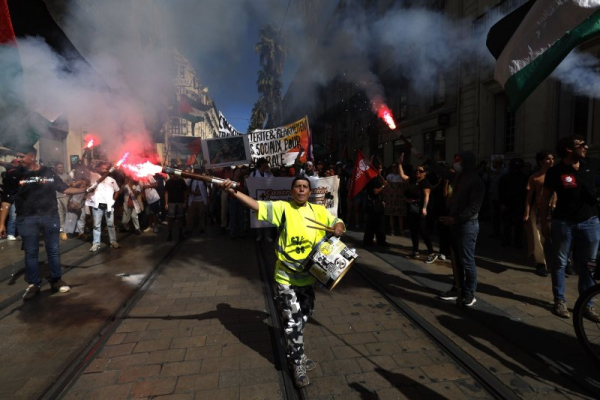

1 of 2 | People protest against austerity measures following a call for action by the “Bloquons tout” (Block Everything) collective in Montpellier, France, Wednesday. Photo by Guillaume Horcajuelo/EPA
Protestors across France have blocked roads, transit and more as the “Block Everything” movement takes hold in the wake of an ouster of the prime minister and the naming of a new one.
Prime Minister Francois Bayrou resigned Monday after a no-confidence vote in the French parliament. He had served nine months.
President Emmanuel Macron named Armed Forces Minister Sebastien Lecornu, 39, as the next prime minister Tuesday. Lecornu, a conservative protege of Macron, took office Wednesday and promised a “profound break” with past policies.
In the wake of the ouster, French people began protests and blockades throughout the country.
The anger erupted when then-Prime Minister Francois Bayrou announced his plan to cut the budget by over $50 billion. He proposed striking two national holidays from the calendar, freezing pensions for 2026 and cutting billions in health spending.
Interior minister Bruno Retailleau told reporters Wednesday that several fires and protests were disrupting life in various districts. About 50 hooded people had tried to start a blockade in Bordeaux, and a cable fire that had been stopped quickly had still managed to disrupt traffic between Toulouse and Auch, The Guardian reported.
Paris police said there have been about 75 people arrested in the demonstrations so far, but did not give details. Traffic disruptions from protests have been reported on highways throughout France, including Marseille, Montpellier, Nantes and Lyon. Retailleau said 80,000 security forces had been deployed throughout the country, including 6,000 in Paris. French media had reported that 100,000 people were expected to participate in the demonstrations.
“We risk having a mobilization that will lead to actions all over the country,” he was quoted as saying by The Guardian.
The “Block Everything” movement began online over the summer from the far-right, but spread on social media and was co-opted by left-wing, antifascist and anarchist groups, NBC News reported. It now includes France’s far-left parties and the country’s labor unions.
In Paris, groups gathered and set up barricades at several entry points to the city. Several transport unions joined the strike, so travel has been disrupted throughout the city.
Hundreds remained gathered outside Gare du Nord, one of the city’s main train stations, despite attempts from police to disperse the crowds with tear gas, NBC reported.
“We are here, even if Macron doesn’t want us, we are here,” protestors chanted.
Outside a high school in eastern Paris, police fought with dozens of students who had blocked entry to the building.
“Police forced the opening of one of the doors to let students in, and there was some violence with tear gas,” Ariane Anemoyannis, spokesperson for the youth group “Le Poing Leve” (The Raised Fist), who was at the scene, told NBC News.
Police also broke up an earlier strike, organized by transport workers near the high school, Anemoyannis said.
“There were several hundred people who showed up in support of the workers,” she said. “The police charged against the picket line to break up the strike.”
“I was expecting either a dissolution [of parliament] or a left-wing prime minister and we have neither, it’s frustrating,” said 18-year-old student Lisa Venier, who was among protesters near the Gare du Nord station, The Guardian reported.
France’s debt is nearly $198 billion, which is equal to about 5.8% of its total economic output and nearly double the European Union’s 3% limit for nations that use the Euro as currency.
“There’s a lot of weariness, shared weariness, a lot of frustration that things aren’t moving forward,” said Lila, a Paris office worker who asked that her family name not be published, The Guardian reported. “That, in part, explains these blockades and this generalized unhappiness.”
Lecornu is the fifth prime minister during Macron’s second term as French president, which began in 2022, and the nation’s third after snap parliamentary elections were held last year.